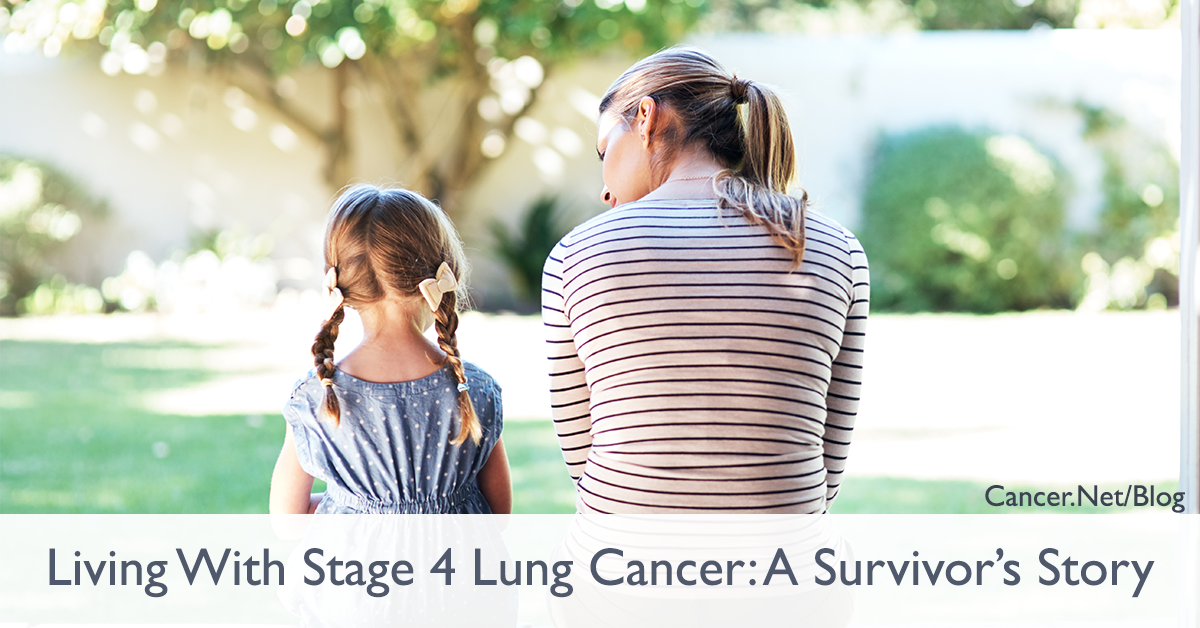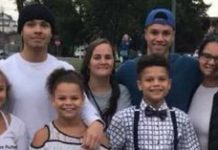
Amanda Nerstad was 39 when she was diagnosed with stage 4 ALK-positive lung cancer and given between 2 weeks and 9 months to live. In September 2021, Amanda celebrated her 44th birthday. She is vice president of the patient group ALK Positive, which brings people with cancer together to learn more about ALK-positive lung cancer. Amanda lives in Knoxville, Tennessee, with her husband and 2 daughters. You can follow Amanda on Twitter.
No one plans for cancer. It seems to reveal itself at the worst possible time. For me, it was a muggy fall morning in Knoxville, Tennessee. After 21 years of living in Chicago, I was overjoyed to be back in my hometown raising our 2 little girls as my husband, Gary, had just accepted a new job in the area. But that joy was snatched from me after I had gone for a jog the previous day and felt a bit more out of breath than usual.
With the girls on the bus and my husband off at work, I decided to head to a walk-in clinic thinking I may have a chest cold or, at worst, walking pneumonia. I finally found a clinic with x-ray capabilities, and after undergoing imaging, I was referred to the emergency room (ER) with a suspected collapsed lung. After plenty of tests and scans, my doctor shared those dreaded 3 words no one ever wants to hear: “You have cancer.” In my case, it was stage 4 lung cancer. To say I was shocked would be an understatement. I had never smoked and had none of the traditional risk factors, and I was an active, healthy mom.
Thankfully, I quickly found an oncologist who recommended comprehensive genomic testing to get more answers and enable us to take action. Despite the world racing around me in that moment, he convinced me that the 2 weeks it would take to receive results were worth the wait because it could identify mutations in my cancer’s DNA that may help us find a targeted treatment plan for me and my cancer.
I had a biopsy taken, and the sample was sent to a comprehensive genomic testing company in Boston. While I waited for my test results, I couldn’t stop thinking about my daughters, who were 4 and 7 at the time. At first, we tried to keep everything as normal as possible for our girls. But one day, my daughter, Isabella, came home from school crying because one of her classmates had said, “Isabella’s mommy has cancer and is going to die.” That’s when we decided to be more open and share details with our kids about my cancer.
Learning about my diagnosis
The comprehensive genomic testing revealed that I had a mutation in the anaplastic lymphoma kinase (ALK) gene. I didn’t know what ALK-positive lung cancer meant at the time, but I soon learned it was a cancer caused by the ALK mutation with no known cause or cure. My oncologist said that having an ALK-positive cancer was like “winning the lottery” because it meant I was eligible for a targeted therapy that could extend and improve my quality of life. This allowed me to relax a bit now that we had a plan, and it certainly gave me a little more peace of mind knowing that the test had provided answers that allowed my doctor to be informed at the outset and help us come up with a treatment plan. We decided to start building my cancer dream team, and I sought out a second opinion with an ALK specialist.
At the same time, I wanted to learn as much as I could on my own about ALK-positive lung cancer, so I started seeking out support groups and resources online. A friend recommended that I look to Facebook, and I joined a closed “ALK+ Cancer Support Group,” where I found a lot of information about what to expect and how to cope both mentally and physically with the disease.
I was really scared at the time, but Gary was there for me every step of the way. We were also able to find a lot of comfort in our faith and the amazing connections I made through the Facebook group, where I discovered a community of survivors with similar challenges, hopes, and fears.
Living with stage 4 lung cancer
I was diagnosed with cancer at age 39, and I just celebrated my 44th birthday in September. We thank God every day for my medical team, support team, our community, and, of course, my targeted treatments. We are so grateful I was able to take that first step and get a comprehensive genomic test. I will likely gain resistance to the medication over time, but for now, I’m clear, and we’ve learned to live life 90 days at a time between my scans.
We don’t really have 5- or 10-year goals anymore. Of course, we talk long-term a little bit, and we’re hopeful for the future, but even planning next summer’s vacation is a big step for us. I say that I don’t want my cancer to define me, but it is a part of me. Throughout this crazy journey, it’s been helpful to stay positive, thank God for our blessings, continue to make family memories, and not sweat the small stuff.
If I were to share some final words of wisdom to anyone just starting their cancer journey, I’d say that it’s okay to have a moment. My days are not always great. If I have a bad day, I give myself 24 hours to be sad, letting my mind “go there.” But the next day, I make myself celebrate something. We’ve celebrated Sister Day and National Dog Day and all these little things. I always try to find something to celebrate.
On those bad days, I also learned to lean on my family and support team. There were days that I thought I couldn’t do it all, especially with my 2 young kids, so I was very grateful to have friends and family lending a hand. Lastly, I learned to be my own advocate, to seek out doctors who are well-versed in my specific cancer, and to find support groups online for my type of cancer. Facebook groups allowed me to relate to other moms with young kids going through the same experience. I found that during cancer, you need just as much mental support as you do medicine!
The author has no relationships relevant to this content to disclose.





